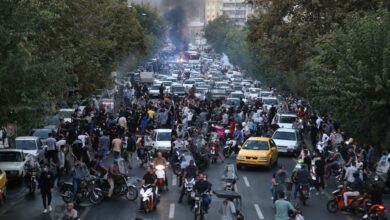The young man in his 20s, known as "Ahmad" looks frightened, shivering as his naked body bleeds from several wounds that have been inflicted with Swiss knives and blades.
He is subjected to ridicule, insults, sexual abuse and more stabs from five or six men present in the room, while he begs for mercy.
His captors continue the torment while filming the abuse on their mobile phones, making no attempt to hide their faces.
This is not one of the notorious police torture clips that were leaked to the public and posted on blogs, snowballing later into "Videogate", with Egypt’s Ministry of Interior facing the heat over the graphically-documented torture cases involving its officers. Our “Ahmad,” purportedly a Giza resident according to Masrawy news website and local blogs, was tortured by fellow citizens over the alleged theft of "a jacket and LE 500," as one of his tormentors is heard shouting about it.
Cases like this one and many others have left rights lawyers and anti-torture activists ringing alarm bells over the "brutalization" of Egyptian society, still fingering the blame largely at the state.
"What happened to the Egyptians?" exclaims Zeinobia, who manages the popular blog Egyptian Chronicles, and was among the first to report on the film online in March.
In a posting, the blogger describes the clip as a "snuff film… [and] very dangerous indicator to where our Egyptian society is going to. It is not about those who tortured Ahmed only but about those sick bastards who exchanged his video clips on their mobile phones as if it were some (Lebanese pop star) Haifa Wahbe music video and enjoyed watching them!!??"
Ahmad Seif el-Islam, a veteran rights lawyer, and himself a victim of police torture, sounds pessimistic as he asserts that “there is a recognition in Egyptian society that torture is legitimate (as a means) to get back your rights and as for revenge. You can look at the behavior of citizens on a bus when they catch a pickpocket. They beat him severely before handing him to the police.”
The lawyer’s concerns are also voiced by retired Brigadier General Mahmoud Qutri, who left the police service around eight years ago, and has since been outspoken against his former generals.
"Thuggery is a virus that has spread in the consciousness of every Egyptian as the only means to defend oneself,” he says.
“I witnessed with my own eyes a case earlier this year. A friend of mine who fell victim to a scam requested the help of a thug in (Nile Delta town of) Mahalla to get his rights back, instead of going to the police. In Mahalla there are two police stations. The thug was referring to himself as the ‘third police station’ because he was providing ’law and order’ in the city. He is doing the job the police should have been doing.”
Qutri, who now works as a self-employed lawyer out of an office in Damanhour, south of Alexandria, usually punctuates his sentences with “our police are for political security not the society’s security.”
Qutri’s arguments are echoed by blogger Zeinobia, in an interview with Al-Masry Al-Youm English Edition. “Torture and violence began to become acceptable means recently to the level that we began to live in a jungle applying its law in order to survive.”
Qutri goes even further, claiming that "the police officers and soldiers are scared from the criminal thugs. They (police) don’t perform their role in the street. The security gap in society has been filled by thugs. Anyone with a knife can impose royalty on shops and businesses in exchange for security, which the police do not provide anymore. Settling cases in courts takes years. People are not going to wait for years to get their rights back. Hiring a thug to get back what is yours has become an easy thing.”
Rights activists like Seif el-Islam had similar complaints: “A judge can rule in your favor regarding some case. But who will execute the verdict?” he says.
“The police are not usually motivated to move and execute the judges’ rulings. If you know a police officer, you’ll seek his help, whether you already had a ruling or not. But you can’t get your rights using the courts anymore.”
Seif el-Islam was probably one of the first to coin the term, “privatization of torture,” to describe the cases his legal clinic had been receiving from the end of the 1990’s. “Someone would get into a fight with his neighbor. Next thing he’d call a police contact of his to teach his neighbor ‘a lesson.’ You then get police officers torturing citizens as a ‘favor’ for their friends,” explained Seif.
Some anti-torture activists, such as journalist Noha Atef who manages the Torture In Egypt blog, concede that “violence has become acceptable mean for Egyptian public to solve problems,” but she’s quick to distinguish this from the sadistic treatment exhibited in Ahmad’s video.
“’Torture’ is still not acceptable… It is still not common that citizens keep a person and torture him.” Noha Atef’s views might be partially supported by the findings of a global poll conducted by the BBC in October 2006, which quizzed more than 27,000 people in 25 countries on the use of torture by the state. In Egypt, “65% voted against employing all sorts of torture.”
“Such (citizen on citizen torture) practices require police protection,” says Atef, “and those who can be protected by police simply ask the ‘Pasha’ to do the torture himself. The victim can take his revenge if he was tortured by a citizen, but will find no way to get his right back from the police officer.”
“The state is giving a model for the citizens how to behave,” says Qutri. “Torture is employed systematically by the police. Everyone knows it from the Minister himself to the lowest ranking soldier. The policing techniques at the moment depend on thuggery, and this is the message the police is sending to the public.”
Qutri doesn’t keep tabs on the number of trials involving police officers who used torture, but says they are “few.”
“Under the current situation, everyone can see that violence is rewarded, whether it is conducted by a police officer or a thug,” comments Mostafa Hussein, a trainee psychiatrist with Nadeem Center for the Rehabilitation of Victims of Violence, an anti-torture clinic.
“There is no rule of law. It doesn’t exist. That creates a problem with conflict resolution in general in Egyptian society.” Hussein adds that overcrowding in urban centers and high levels of noise pollution are among the catalysts for violent behavior, although not the root causes.
But of course it doesn’t help, Hussein of the Nadeem Center continues, "if the person entitled with keeping the law is violating it."
"The victim of police torture is usually the ordinary citizen, not necessarily the political activists. There are slums in Egypt, whose entire male population has suffered one form or another of police violence. Why not expect the victims to incorporate the violence they receive into their daily behavior?”
Al-Masry Al-Youm English Edition’s attempts to obtain a comment from the Ministry of Interior regarding Ahmad’s torture video and a response to some the issues raised by the interviewees failed, as its media department did not answer the newspaper’s calls.




